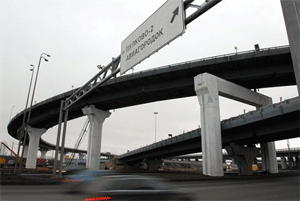08.23.2008 08:36
 Environmentalists have raised concern over the ecological and economic sustainability of the St. Petersburg Western High-Speed Diameter, Russia’s first toll road which is due to be completed by 2012.
Environmentalists have raised concern over the ecological and economic sustainability of the St. Petersburg Western High-Speed Diameter, Russia’s first toll road which is due to be completed by 2012.
The ZSD Nevsky Meridian consortium was awarded the tender for the construction of the controversial motorway flyover project, which consists of a series of tunnels and bridges, at this year’s St. Petersburg International Economic Forum in June. The consortium includes the Austrian builder Strabag, France’s Bouygues, Hochtief PPP Solutions and Egis Projects and is controlled by Russian billionaire Oleg Deripaska’s Basic Element.
Analysts say that the construction of the Western High-Speed Diameter (WHSD) will ease traffic congestion around the city center. It will cut journey times and reduce pollution levels, connecting the northern and southern sections of the ring road and forming a circular highway that encompasses the city suburbs.
“This project is significant for all of Russia and determines the development of St. Petersburg. We are proud to say that it is among the first strategic private-public partnership projects in the city,” said Maxim Sokolov, the head of City Hall’s Committee for Investment and Strategic Projects, after the winner of the tender was announced.
Fifty percent of the necessary investment will come from private investors, 34 percent will be provided by the federal budget and 16 percent will be provided by the city. According to the agreement between the consortium and City Hall, ZSD Nevsky Meridian will have the right to manage the WHSD for the next 30 years.
However, the planned WHSD, a 46.6-kilometer eight-lane toll road, has come up against strong opposition in the city. At a picket held last weekend at the entrance of the Yuntolovo nature reserve in the Primorsky district, activists from the Save Yuntolovo ecological movement invited people to sign a petition against the motorway. The activists, who have already collected 50,000 signatures, say that the road will impinge on residential and recreational areas on Vasilievsky Island and Krestovsky Island and in the Yuntolovo reserve, because various commercial objects will be constructed along it.
“The residents will be deprived of a large green area that has a positive influence on the air quality in the western districts of the city,” said Tatyana Kuzmina, a member of the Save Yuntolovo group.
According to experts, the zones that the road and its additional facilities will occupy have great ecological and cultural value.
“The project documentation names only partial measures that the operating consortium could conduct to protect the environment. The ecological value of the wetlands and swamps at Lakhta (partly occupied by the Yuntolovo reserve), lies in the harmony of the nature there, which is integrated with the city environment,” said Georgy Noskov, head of the laboratory for ecology and preservation of birds at St. Petersburg State University’s biology research institute.
Negative impacts on the cultural and architectural hallmarks of the city have also been cited as a risk.
The WHSD site borders on the Kiryanovo country estate and Yekaterinhof park, which both date from the 18th century, as well as on the 19th-century Church of the Epiphany of Christ on Gutuyevsky island.
“A lack of information about the project has been the main obstacle in our activities. The lack of many materials gives experts the right to consider the WHSD project a violation of the cultural and natural values of the territory on which it will be built, worsening the living conditions of local residents,” said Alexander Karpov, the director of ECOM, a St. Petersburg-based organization that encourages public participation in government decisions connected with nature.
The economic sustainability and risk involved with the project, which will be co-financed by several international developmental banks, are also currently under dispute. The European Bank for Reconstruction and Development is the biggest global institution mandated to provide infrastructural finance for transition countries to be considering co-financing the WHSD.
“Instead of stepping into such a megalomaniac and economically and environmentally risky project as this one and filling the pockets of the Russian oligarchs, the EBRD should invest in the rehabilitation of the obsolete existing Russian infrastructure,” said Klara Sikorova, the International EBRD Coordinator at CEE Bankwatch Network, after the results of the tender were announced.
Since spring 2006, the construction costs of the WHSD have risen from $2.4 billion to $8.9 billion — about two thirds of St. Petersburg’s annual budget. Forecasts predict that 94,000 vehicles per day will use the road.
Opponents of the project say this figure is overestimated and biased, and warn that according to the conditions of the tender, in the event of lower revenues than expected, the city will have to compensate the contractor from its own budget.
“Fluctuations in traffic have to be taken very seriously — the prognosis for traffic through the Gerren tunnel near Lubek (Germany) was 37,000 vehicles per day. In reality, the traffic flow was 22,000 per day, and the contractors Hochtief and Bilfinger Berger soon had to increase the toll rates in order to reach the projected profits,” said Pippa Gallop, a research coordinator at Bankwatch International Network.
According to Vera Ponomareva, a member of Save Yuntolovo, the EBRD has decided to carry out an additional assessment of the project next month.
“During the course of consultations held with the EBRD, the environmental groups Save Yuntolovo, Protect Vasilievsky Island and EKOM were satisfied by the result. The bank is keen to reassess the project and to put pressure on the city’s administration to disclose the documentation, conduct a state ecological inspection and obtain an independent traffic prognosis,” said Ponomareva in an interview.
News source: Times.spb.ru
 Print this news Print this news
Business news archive for 23 August' 2008.
Business news archive for August' 2008.
Business news archive for 2008 year.
|